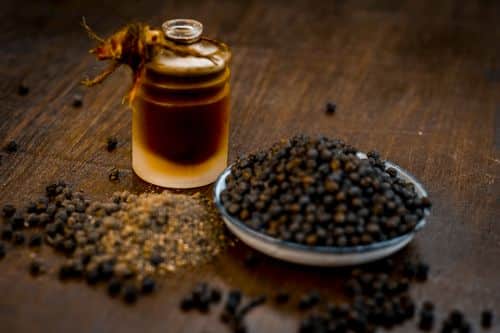Black Pepper – Benefits, Nutrition Value & Uses of Pepper

Hiral Patel
October 12, 2022

Hiral Patel
October 12, 2022
Black pepper is one of the most commonly used spices worldwide. Known as the ‘king of spices’, it forms a significant part of a large number of cuisines all over the world, used in cooking as well as garnishing.
Concealing a trade history of 4000 years, this spice was once one of the most globally traded commodities. Also, used as a currency in the Middle East, Black pepper is always known as more than just a humble household ingredient.
Black pepper powder, that comes with a mildly spicy flavour, is made by grinding peppercorns, obtained from the plant Piper nigrum. Since ancient times, black pepper has been considered to have essential health benefits.
Therefore, in addition to adding flavour to foods, black pepper has wide-ranging beneficial properties for health. It fights cancer, is an antioxidant, relieves cough and cold, treats skin problems, enhances weight loss efforts, etc.
Black pepper has about 304 calories per 100 gm of weight. We can call it a ‘superfood’ as it is a rich source of a large number of nutrients. Below is a detailed account of the nutritional facts of black pepper.

Black pepper is a rich source of antioxidants. These antioxidants work to fight free radicals, which are molecules, generated both outside and inside our body. Also Free radical generation and damage happen through chemicals, toxins, pollutants, pollution, harmful rays, etc. Some of these free radicals are also created naturally — while exercising, digesting food, etc. Exposure to these free radicals leads to bodily damage and may lead to significant health problems.
Studies have suggested that a diet high in antioxidants may help prevent or delay the damaging effects of free radicals. Black pepper contains the compound piperine which has been proved to have antioxidant effects and thus helps to prevent free radical damage to your cells.

Cold and cough are one of the most common respiratory problems that affect all of us.
Black pepper is a major component of Ayurvedic medicines that have been used for as long as a cure for these problems. These medicines provide relief from nasal congestion and help in the removal of mucus from the respiratory tract, for a faster recovery.
Black pepper can be added to green tea, or with lukewarm water along with turmeric. Old Ayurveda remedy for cold and cough – Black pepper, a pinch of turmeric, 2-3 drops of honey – mix well and consume with lukewarm water.
This concoction is extremely healthy and the antimicrobial potential and gastro-protective modules present in black pepper are also known to be an immunity booster.
Black pepper has a stimulatory effect on our brain. It especially helps patients with neurodegenerative diseases. It improves memory and cognitive function in an individual by stimulating the chemical pathways in the brain.
Additionally, it also acts as an antidepressant and elevates an individual’s mood. Black pepper contains the compound piperine, which has been shown to improve cognitive ability in animal studies.
It also has shown promising results in preventing Parkinson’s disease by triggering the production of dopamine in the brain, the absence of which causes the disease.
Black pepper is useful in controlling the sugar level in patients with type 2 diabetes. Type 2 diabetes is caused when the pancreas in our body is not able to produce enough insulin or when the body stops reacting adequately to otherwise normal levels of insulin.
For this, nutritionists often claim that adding black pepper to your diet can help lower the risk of high blood sugar. Black pepper’s antioxidant properties help to stabilize blood sugar, while also boosting the digestive tract’s health. In addition to this, black pepper helps to fight obesity, which is also one of the major contributing factors of diabetes.

Congestive heart failure is one of the most common diseases and is a leading cause of death worldwide.
High blood cholesterol and hypertension are the most common causes of this disease. Studies have suggested that black pepper can lower the levels of blood cholesterol.
Piperine in black pepper helps reduce cholesterol uptake, reduces the levels of ‘bad’ cholesterol (LDL- Low-density lipoprotein) while simultaneously increasing the levels of high-density lipoprotein ‘good’ cholesterol (HDL- High-density lipoprotein).
It is proved that dietary intake of black pepper has shown a positive effect on lipid regulation.
Black pepper has also been shown to have anti-carcinogenic properties. The compound piperine, with its antioxidant properties, reduces damage to your cells and keeps the tissues healthy. Thus, eating freshly ground black pepper can help you to keep cancer at bay, due to its anti-inflammatory, antibacterial and antioxidant effects.
Black pepper helps to increase the absorption of essential nutrients. Due to its inhibitory activity on drug metabolising enzymes, it can help to increase the bioavailability of some nutrients like calcium and selenium, as well as beneficial components found in green tea and turmeric.
Black pepper helps in the process of digestion. It has been found to have a stimulatory effect on the entire digestive system.
Piperine, found in black pepper, stimulates the secretion of hydrochloric acid (HCl) in the stomach, which again helps to digest proteins. It also flushes out toxins from the intestine and helps resolve gastrointestinal disorders.
However, it should be added to your diet after consulting a doctor if one is pregnant or on medication.

Black pepper supports weight loss efforts. It helps to break down fat cells, and also plays a significant role in increasing the levels of metabolism in the body.
This increased metabolism allows for an increased breakdown of lipids. Its outer layer contains phytonutrients that induce the breakdown of fat cells and help you lose weight.
Black pepper is known to prevent excessive skin pigmentation. Vitiligo is a skin condition which results in the appearance of discoloured patches over different areas of the body. It occurs when the skin loses the pigment cells (melanocytes).
These cells produce the pigment melanin, which gives the skin its colour. Black pepper helps prevent vitiligo and maintains the original colour of the skin. Additionally, black pepper may also help to clear acne by doing away with the intoxicants in it.


Black pepper tea is a commonly used remedy for coughs and sore throats in Ayurveda. The main ingredient is ground black pepper. Add ginger, lemon, honey and other ingredients for flavour.
Black pepper is a popular spice and is an essential ingredient in the diet of people in all parts of the world. It multiplies the flavour of every dish where it is added and tingles our taste buds. This flavour-enhancer, with its bold flavour, is an excellent addition to almost any dish.
Besides the taste factor, black pepper also contains many nutrients and potent compounds like piperine. Piperine is a compound in black pepper which has been shown to exhibit therapeutic properties. It has wide-ranging benefits like antioxidants and anti-cancer effects, helps to counter skin problems, etc.
Find this article useful? Check out other interesting articles from HealthifyMe on our website!
A. Black pepper is LIKELY SAFE when taken by mouth in controlled amounts commonly found in foods. Black pepper might have a burning aftertaste if taken in larger amounts at a time. If it gets into the eyes, black pepper can burn. Inhaling black pepper through the nose or mouth can cause coughing. Taking black pepper in amounts greater than those in food might increase the risk of bleeding in people with bleeding disorders. People with diabetes, Post surgery, Pregnant and lactating women should adjust amounts as per medications and tolerance level. People with black pepper allergy should avoid it completely.
A. Black pepper helps in good digestion and when it is consumed raw, hydrochloric acid is released by the stomach and helps in breaking down the proteins.
A. Chemical compounds of black pepper, particularly piperine, may be effective in the early acute inflammatory process.
A. Normal sneezing due to black pepper is common. It’s not very common hence most people aren’t aware of black pepper allergy. Black pepper allergy symptoms can be mild in most cases, but in rare cases, the person may experience severe allergic symptoms like it is a nemesis for hypersensitive people because it triggers different allergic symptoms.
A. Black pepper is a rich source of antioxidants, they lower cholesterol levels in the body, stimulate digestion, manage blood sugar levels, etc.
A. This spice is a powerhouse of medicinal benefits. It treats arthritis, stomach problems, asthma, menstrual pain, prevents vitiligo, has cancer-fighting properties and many more.
A. You can have black pepper in your meals. However, you must not have an excess of them. Limit your black pepper consumption to 1-2 tsp a day.
A. Yes, back pepper provides tons of benefits. From improving metabolism, contributing to bone health to its antibacterial properties to prevent cough and cold.
A. The active ingredient in back pepper, piperine is known to lower blood pressure and improve cardiovascular health.
A. You can add black pepper as an ingredient to any of your meals. However, if you wish to have black pepper tea, you should consume it in the morning, before breakfast.
A. For decades, Indians have relied on a herbal concoction called a Kadha to help boost immunity in children and treat colds. The scientific explanation is, black pepper contains antibacterial compounds that boost the white blood cells in the body, thus combating bacteria and viruses.
A. Black pepper contains piperine that lowers bad cholesterol and increases the production of good cholesterol in the body. Thus, preventing cardiovascular disease and promoting heart health.
A. Yes, you can boil black pepper in water or milk to not just flavour your beverages, but also for additional health benefits.


Can black pepper cure cough?
Hello Garg, Black pepper has antibacterial, as well as anti-inflammatory properties that help in curing cough and cold.
Is black pepper good for sinus?
Hello Nilavanj, This spice is considered a natural decongestant. It contains certain properties that cause irritation to the membrane inside the nose and thus produce excess mucus that eventually clears the respiratory tract or the sinus.
Can I make black pepper tea?
Hello Amrish, Yes, you can easily prepare yourself a cup of black pepper tea with minimum ingredients. You would require 2 cups of water, freshly ground black pepper, lemon juice, grated ginger and honey.
Does black pepper raise blood pressure?
Hello David, Quite the opposite, Black pepper reduces blood pressure.
Is pepper good for BP patients?
Hello Jadhav, Yes, if you suffer from high blood pressure, regular consumption of back pepper can help you regulate your blood pressure and help BP patients.
Can diabetics use black pepper?
Hello Gauri, Black pepper’s antioxidant properties help to stabilize blood sugar. So, if you are diabetic, you can consume black pepper.
Is black pepper rich in vitamin C?
Hello Naji, Yes, tsp of black pepper contains around 1.4 mg of Vitamin C.
Does Pepper have any nutritional value?
Hello Janu, Black pepper is an excellent source of Vitamin A, C fibre and folic acid. It’s also rich in antioxidants, potassium and manganese.
Is black pepper good for the lungs?
Hello Soni, Black pepper is known to improve breathing and help patients with asthma.
Is black pepper keto-friendly?
Hello das, Yes. the amount used for cooking gives very less carbs.
Thank you so much for such a lovely article with informative content. Reading your article made me realize the importance of eating black pepper. Hope to see more of the related articles.
Nice sir ????